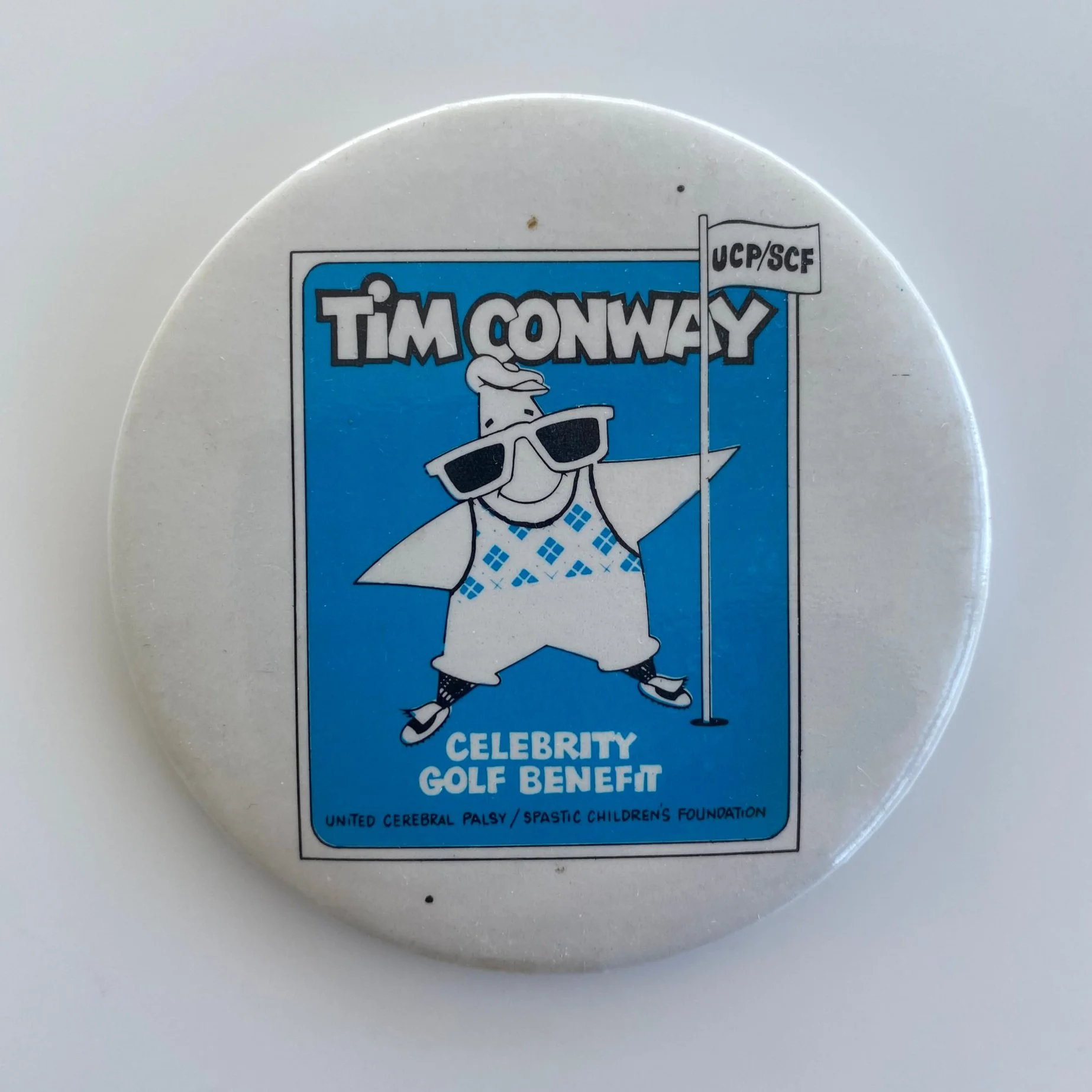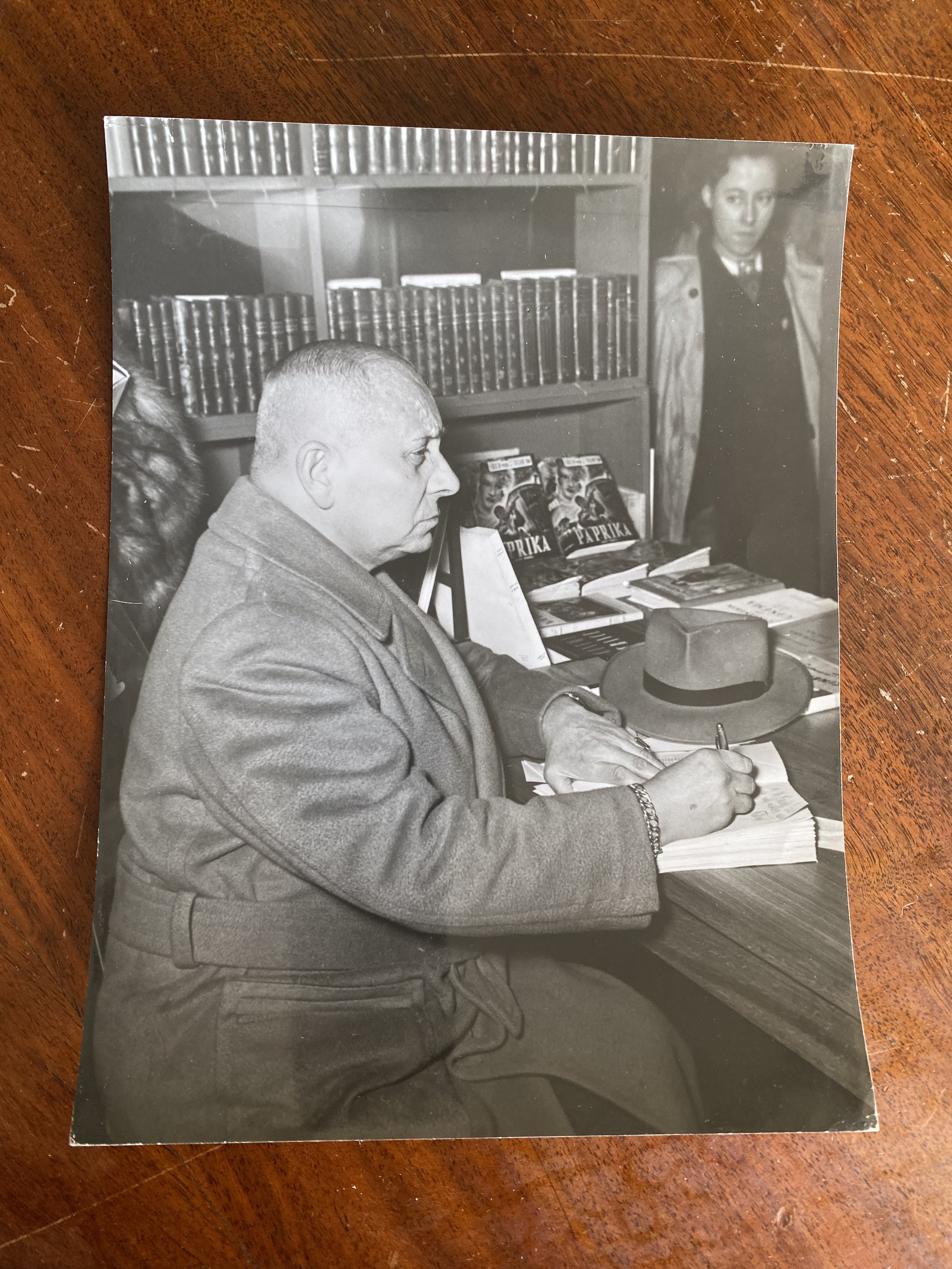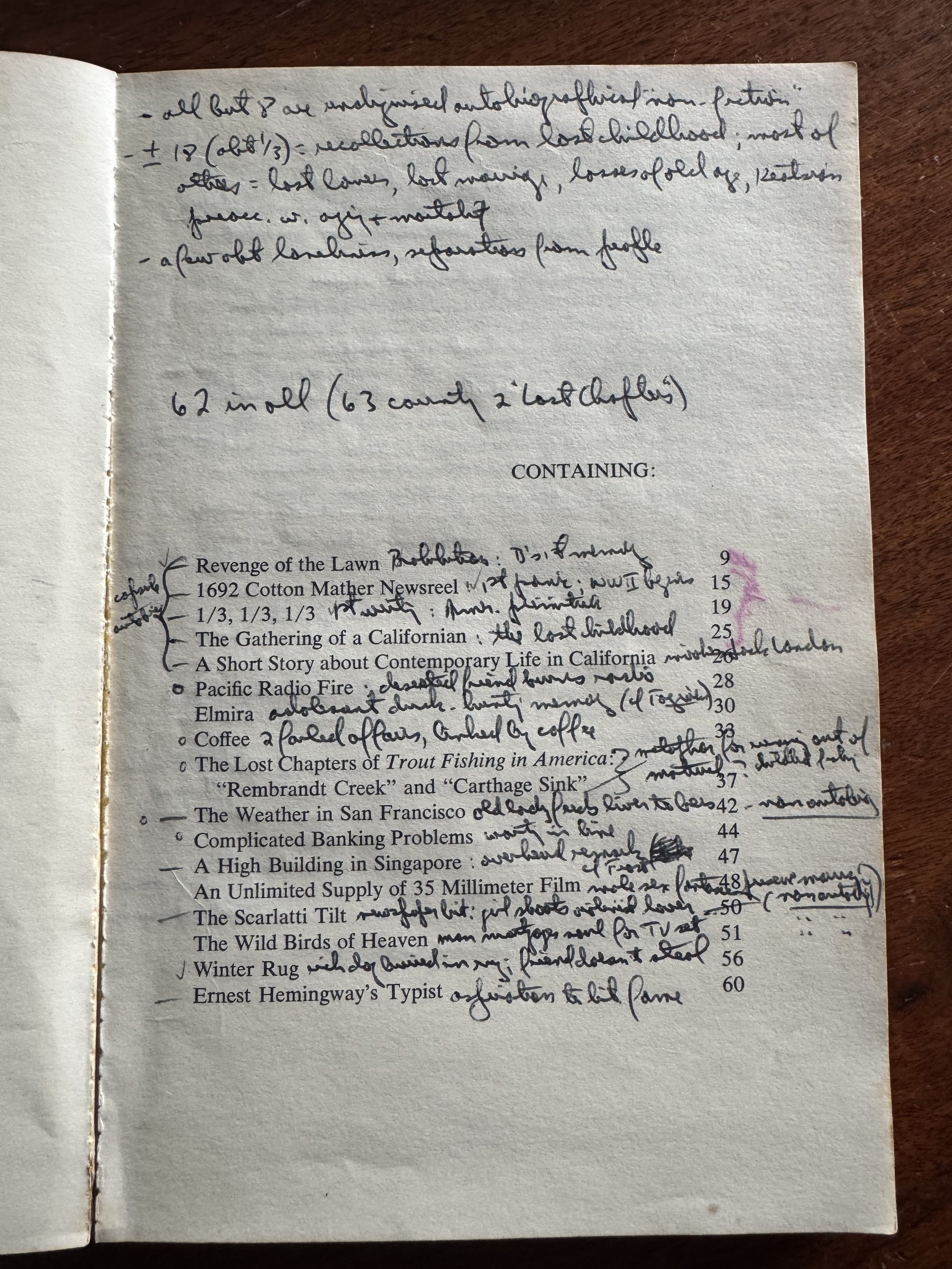Inscriptions, Dedications, Doodles of Note
1982 Exhibition Catalogue for "S. Clay Wilson Selected Works" at the Museum of the Surreal and Fantastique N.Y.C. (anyone been there?)
Inscribed to Terry Southern
The Waste Land
by T.S. Eliot First Edition Second Impression 1923. Copy #72 of 1000
Inscribed by Eliot "in homage" to S. J. (Sid) Perelman, New Yorker writer, author of several Marx Brothers screenplays, and brother-in-law of Nathanael West. Book label from The Booke Shop Providence indicates Perelman may have purchased this copy while a student at Brown.
Probably signed to Perelman in 1952, as Perelman mentions seeing Eliot in New York in a letter to a friend in that year
Tim Conway "Dorf on Golf" Poster Inscribed to Frank Zappa
'Tis the Season to be Wary
by Rod Serling
The dedication copy signed by Serling to dedicatee Sammy Davis Jr.
Not an association I saw coming...
Theory and Design in the
First Machine Age
by Reyner Banham
inscribed to Buckminster Fuller
"Bucky... last master of the first machine age (see p. 326)... past master of the second (see the world at large)"
Banham's paean to Fuller in this canonical history of the Modern Movement actually starts on page 325.
see also Unveiling the Unhouse for more on this odd couple.
Sur un air de navaja
by Raymond Chandler
The very loose Série Noire French translation of The Long Goodbye, Chandler's desk copy eventually gifted to his secretary with a partially unreadable but quite affectionate inscription in what is obviously not his native language.
The Tokyo-Montana Express
by Richard Brautigan
Richard Brautigan to Norman Mailer: "Let's have that drink." I don't believe it ever happened.
Slow Fade
by Larry McMurtry
Larry McMurtry's advance reading copy of Slow Fade
Flash and Filigree (1958)
Terry Southern
The Dedication Copy.
An unusually terse inscription to the dedicatee, in this case his wife of two years, Carol Kauffman.
Miami and the Siege of Chicago (1968)
by Norman Mailer
The Dedication Copy.
A touching inscription by Norman to his Dad, the dedicatee of one of his greatest books:
"because, Dad, you taught me that the essay is not a literary form, but a way of life..."
400 Traveling Salesman’s Jokes
by Henny Youngman
Henny to Jer. ‘Nuff said.
Taylor Mead on Amphetamine and in Europe (1968)
Inscribed to Warhol Superstar Viva and her then husband Michel Auder. Taylor's French is about on a par with Raymond Chandler's (see inscribed Un Air de Navaja)
Red Dirt Marijuana
by Terry Southern
Inscribed to Dennis Hopper in the voice of a Mexican hooker. You need to be over 18 to read this inscription.
The Short-Timers (1979)
by Gustav Hasford
Hasford had a tough life after the war, notwithstanding the success of his novel and the film (which he co-wrote with Kubrick and Michael Herr). He died in penury, having done time for book theft. Here's the Wikipedia account (which alludes to his nomination for an Academy Award -- he skipped the ceremony because he was fighting with his co-authors over the credit):
n 1985, Hasford had borrowed 98 books from the Sacramento, California, public library but never returned them. An arrest warrant for misdemeanor grand theft was issued, but local authorities were unable to find him.[7] In March 1988, shortly before the Academy Awards ceremony, campus police from California Polytechnic State University in San Luis Obispo, California, found nearly 10,000 library books in his rented storage locker. At that time, he had 87 overdue books and five years of Civil War Times magazine issues checked out from the Cal Poly-SLO library; the materials were initially valued at $3,000 (they were later revalued at $20,000).[8]
Hasford's book collection included books borrowed (and never returned) from dozens of libraries across the United States, from libraries in Australia and the United Kingdom, and, allegedly, books taken from the homes of acquaintances. Among them were 19th-century books on Edgar Allan Poe and the American Civil War. Hasford had obtained borrowing privileges at Cal Poly-SLO as a California resident, using the residential address of a motel near campus and a false Social Security number.[7][9]
In June 1988, he was charged with two counts of grand theft and ten counts of possession of stolen property.[10] Judge Harry Woolpert of the San Luis Obispo County Superior Court scheduled the trial hearings to begin on December 5.[11] During the trial, Hasford rearranged to plead guilty to possession of stolen property. On January 4, 1989, Hasford was sentenced to six months' imprisonment (of which he served three months) and promised to pay $1,100 in restitution from the royalties of his future works. He was also ordered to pay the shipping costs for the return of 748 books to nine libraries throughout the United States.[12][13]
In a form letter addressed to friends and family, Hasford claimed that he wanted the books to research a never-published book on the Civil War. He described his difficulties as "a vicious attack launched against me by Moral Majority fanatics backed up by the full power of the Fascist State."[14]
Paprika (1937)
by Eric von Stroheim
"From one bum to another!"
Elaborately and extensively inscribed to Jim Tully, "an American vagabond, pugilist, and author." (Wikipedia) Tully, a precursor of the hardboiled genre, is a whole other story.
Accompanied by a publicity photograph of von Stroheim at a booksigning. He looks like he'd rather be anywhere else. The description of the novel on Amazon's website bears repeating here:
"All the wild passions and secret, earthy customs of the Gypsy are faithfully delineated in this colorful masterpiece. But it is more than savage and fascinating romance! It is also the ironical study of the dark places of a woman's soul... a woman whose flamelike beauty and cruel desire won her a Prince in marriage. This although she started life and finished it a ragged Gypsy lass. Before she was fifteen, her tribesman were fighting over her as dogs fight for a bone."
Although best known as Raymond Carver's editor (and then some), Lish was close to the Merry Pranksters. Their bus, "Further," was often parked in front of the Lish home in Burlingame California. Bus driver Neil Cassady was a frequent guest, mentioning chez Lish on page 151 of The First Third.
Kesey could have used Spellcheck.
Hubbin’ It.
Ken Kesey to Gordon Lish
David Foster Wallace's immersion in the tax code prior to writing The Pale King.
In addition to being underlined and annotated by its previous owner -- an actual accountant --the book contains such conceptual nuggets by DFW as:
"Taxes are, strictly speaking, unnecessary for the Fed Govt, since it can print as much money as it wants," or
"The more knowledgeable citizens are about the tax law the less revenue is collected. In govt interest to have befuddled taxpayers."
Nuff respect.
Renata Adler pays homage to Henri Langlois, Cinema OG.
Best biography title ever.
Signed by four members of Wills' band, including the great vocalist Tommy Duncan and steel guitarist Leon Macauliffe ("Take it Away, Leon"), on the occasion of a big to-do at the Tulsa Chamber of Commerce honoring The King of Western Swing.
I acquired this book from Nick but can't remember what he thought the inscription was about. It's definitely Pound's writing, complaining about something having to do with the New Directions edition. Maybe one of you Pound scholars out there can shed some light?
Ars longa vita brevis:
Frank O'Hara to Morris Golde
O'Hara was staying with Golde on Fire Island and went clubbing with him and Virgil Thompson on the night of his horrible fatal accident.
First edition of Carpenter's greatest work, inscribed to Mailer, boxed with an advance reading copy of same
Don Carpenter to Norman Mailer: "all kidding aside"
SFP (Strictly for Professionals):
John Barth's teaching copy of Richard Brautigan's collected short stories
Revenge of the Lawn is dedicated to Don Carpenter.
Countercultural Double Play: Wurlitzer to Bartel to Di Prima
Ezra Pound to himself, via Nick Tosches
Rudy Wurlitzer's (Two Lane Blacktop, Pat Garrett and Billy the Kid) first novel, inscribed to Paul Bartel (Eating Raoul, Death Race 2000), then passed on five years after publication to preeminent Beat poetess Diane Di Prima, who wrote her name and the year above Rudy's inscription.
Postcard from Tangiers
Alan Ginsberg to Marilyn Meeske at Olympia Press
Meeske wrote one porno solo (Flesh and Bone, 1957) and co wrote The Pleasure Thieves (1956) as Henry Crannach, with the great Iris Owens under her usual pseudonym Harriet Daimler. Owens' After Claude is having a moment after its reissue by Columbia, where her papers reside.
Meeske apparently held some editorial responsibilities as well, as Ginsberg's postcard attests.
Fan mail of the avant gardes:
Ed Ruscha to Kathy Acker
Caveat Emptor: Forgeries and Pirated Editions
E.L. Doctorow throws a fit of pique at being asked to sign a Chinese knockoff of Ragtime but sorta signs anyway.
Gary Snyder is more gracious to legendary bookseller Peter Howard of Serendipity Books, indulging in a granular analysis of his own signature
From one cosmonaute (sic) of inner space to another: William Burroughs to Alexander Trocchi
A later printing, but inscribed by Ginsberg to Harry Smith. Drawing by AG, colorizing by Smith. Ginsberg's inscription alludes elegantly to Smith's notoriously sticky fingers when visiting friends.
The mother of all Beat associations. Inscribed by Gregory Corso to Jack Kerouac, with a poem to Corso by Kerouac, when they were the only two Beats published. This was before the Gallery Six reading (at which Corso was to have read from this, but showed up too late). Preceded in print only by Kerouac's own protobeat novel The Town and the City.




































































